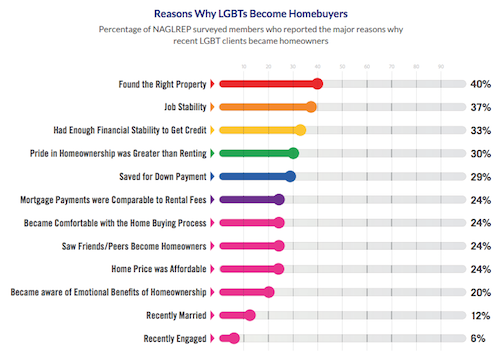Although housing discrimination continues to be an issue for many in the LGBT+ community, more LGBT+ couples are buying homes.
The National Association of Gay and Lesbian Real Estate Professionals (NAGLREP) put out its annual report looking at LGBT+ homeownership trends and found that since the 2015 Supreme Court marriage equality ruling, LGBT+ couples are now showing a stronger desire to purchase homes. Nearly half of those surveyed reported more LGBT+ married couples buying a home since the decision.
But it is not just married couples who are purchasing homes together. Around 28 percent of members believe more unmarried LGBT+ couples and singles are buying a home now than they were before 2015.
The main reason why LGBT+ buyers are becoming homeowners is because they found the right property, followed by financial reasons like job and financial stability. Financial reasons were also the main reason why LGBT+ renters have not jumped into homebuying just yet with 62 percent of members believing that renters are concerned about their financial status, and 59 percent believing they live in an area where the cost of homeownership is too high.
“Homebuying and selling decisions are often predicated on such life events as marriage, children, new jobs, death and divorce, yet our members believe LGBTs have a more pragmatic approach based on financial security,” said NAGLREP founder Jeff Berger in a statement.
Overall the LGBT+ community continues to be a driver in the real estate market as 41 percent of those surveyed believe their LGBT+ clients will become “move-up” buyers in the near future, 20 percent will be downsizing, 27 percent believe their LGBT+ clients may buy a second home and 31 percent expect their LGBT+ clients will be buying an investment property.
“These findings are eye-opening for us and we hope for all of the real estate community,” Berger said. “There are a variety of reasons LGBTs may not be as aware of the emotional and financial benefits of homeownership, but we now recognize the need for further, and potentially more targeted, education and enlightenment.”


